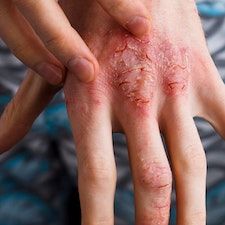Article
Treatment Response and Adverse Effects Not Associated with Serum Dupilumab for Atopic Dermatitis
Author(s):
An analysis of serum dupilumab treatment for atopic dermatitis patients suggests a lack of association between either response or adverse effects.

A recent study found no association with either treatment response or adverse effects to serum dupilumab in atopic dermatitis (AD) patients for their first year of treatment.
The study was conducted to evaluate serum dupilumab levels after 16 weeks of treatment and to examine associations of serum dupilumab levels with response as well as adverse effects in AD patients. The research team was led by Lotte S. Spekhorst, MD, of the National Expertise Center for Atopic Dermatitis, Department of Dermatology and Allergology at the University Medical Center Utrecht.
“This prospective clinical cohort study found a broad range of serum dupilumab levels at 16 weeks of treatment and no association with treatment response and adverse effects during first year of treatment,” they wrote. “Response may be dependent on target availability of the interleukin-4 receptor subunit α, with an interpatient variability producing heterogeneity in response.”
Background
The study was a clinical, prospective, observational cohort study utilizing data from the prospective BioDay Registry, with the investigators recruiting adult AD patients beginning dupilumab therapy and for whom the serum was accessible for 16 weeks. Study participants were given a loading dose of dupilumab 600 mg subcutaneously and later 300 mg for every other week of study, the analyses of which were performed from January to June of 2022.
The investigators assessed the severity of AD at baseline and then after 16 weeks and then 52 weeks, making use of the Eczema Area and Severity Index (EASI) for their analysis. They defined participants’ treatment response as the percent reduction in EASI score versus patients’ baseline score and as an absolute EASI cutoff score of 7 or less. They also assessed adverse effects for the first year of study.
Findings
The research team found that of the 295 total participants with AD, there was a mean age of 41.5 years, with 57.6% of participants (170) being male and about 42.4% (125) being female. The investigators also reported that of the 295 AD patients, their median IQR [range] drug level was found to be 86.6 μg/mL (64.6-110.0 μg/mL [10.1-382.0 μg/mL]) by 16 weeks of dupilumab treatment.
They found no significant differences in serum dupilumab levels between responder statuses (EASI, <50, 50, 75, or 90) by 16 weeks of treatment, and they found that serum dupilumab levels at 16 weeks were found, through a multivariate logistic regression analysis, to have demonstrated nonsignificant odds ratios with regard to predictions of long-term response to the treatment.
“This study measured serum dupilumab levels in a large population of patients with AD treated in daily clinical practice,” they wrote. “A broad range of serum dupilumab levels at week 16 was found in the total cohort, and these levels were substantially higher compared with serum levels of monoclonal antibodies used in other diseases, such as inflammatory bowel disease and psoriasis.”
The study, “Association of Serum Dupilumab Levels at 16 Weeks With Treatment Response and Adverse Effects in Patients With Atopic Dermatitis/ A Prospective Clinical Cohort Study From the BioDay Registry,” was published online on JAMA Dermatology.



